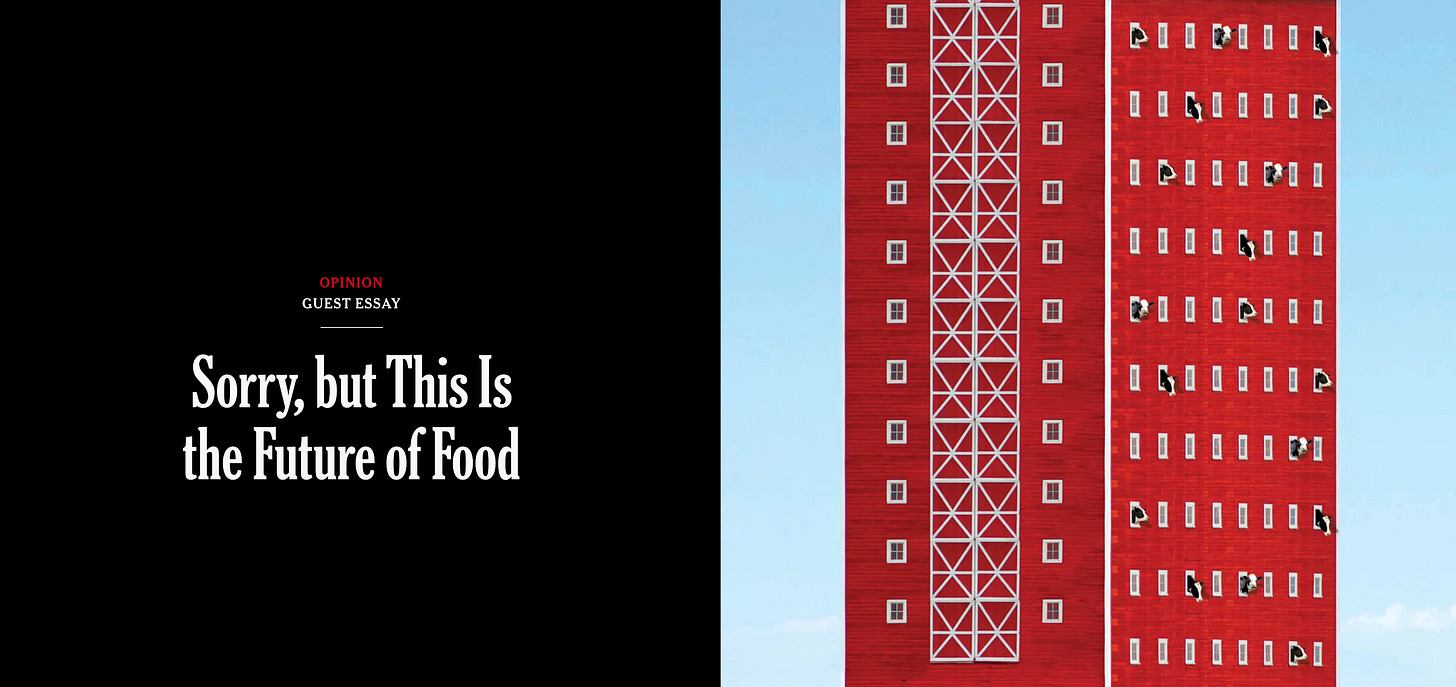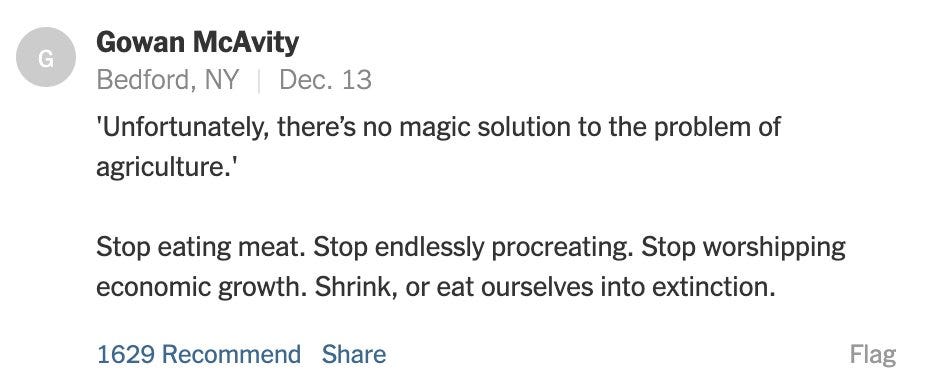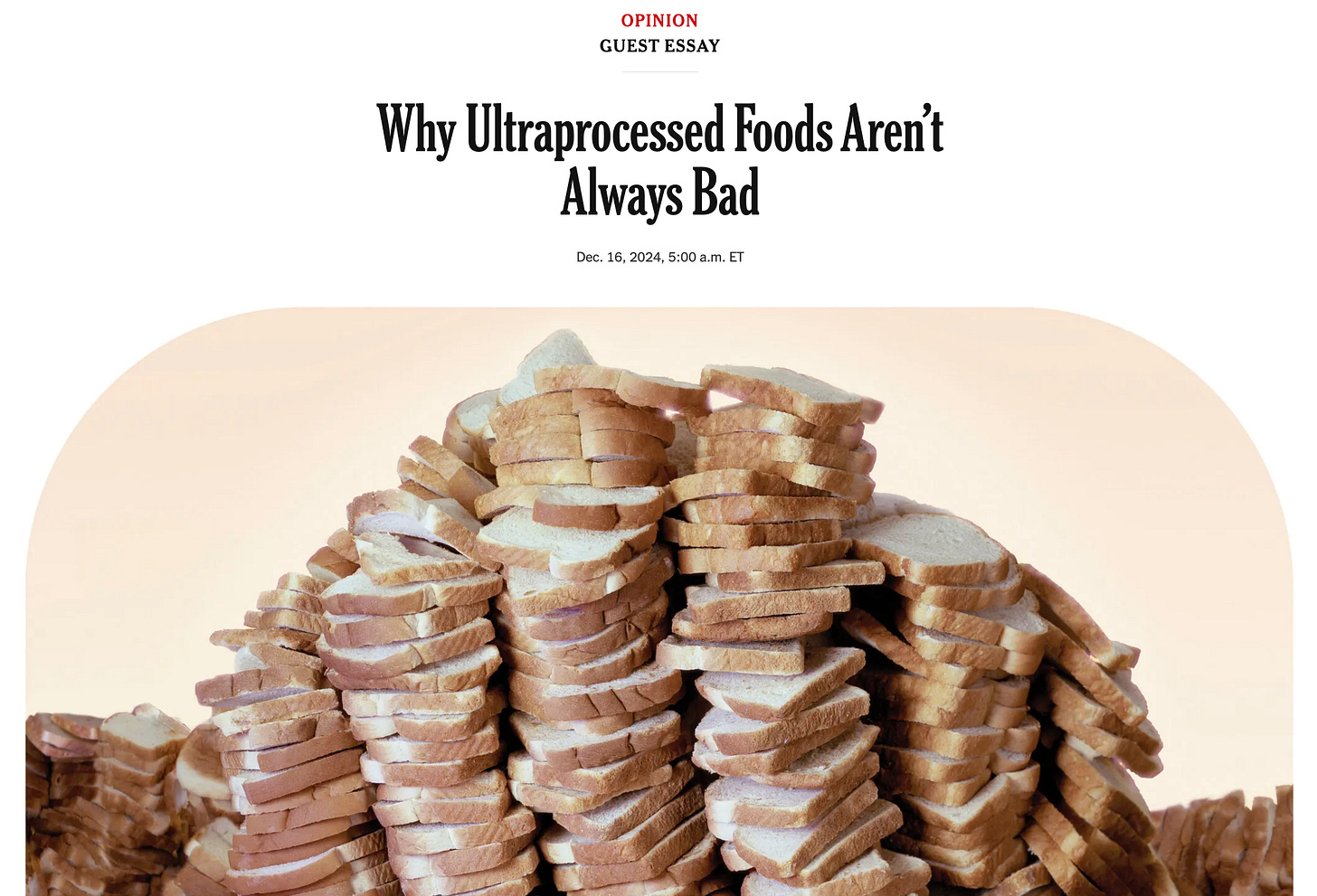Your future is factory farms and Froot Loops, says The New York Times
Three opinion pieces this weekend made one thing clear: industrial systems aren't the problem, you are — for questioning them.
The New York Times is often referred to as The Grey Lady, but it may be time to update that to The Senile Lady given what came out of the Opinion desk over the weekend.
Corporate conflicts of interest were firing on all cylinders. Three notable op-eds made the rounds, offering a buffet of opinions worth chewing on, at least if you're a fan of factory farms, processed foods, and corporate transparency theater.
First up, journalist Mike Grunwald delivered a piece titled “Sorry, but This Is the Future of Food.” Originally published under a far more controversial headline — "We’re Going to Have to Learn to Love Factory Farms" — it quickly became a flashpoint for criticism.
Grunwald’s argument? Industrial agriculture is the only realistic way to feed the planet’s growing population without further devastating the environment. By his calculations, industrial farming’s efficiencies — pesticides, fertilizers, and high-yield genetics — save land and resources, unlike those pesky, nostalgic, “back-to-nature” farming practices that many in the MAHA movement advocate.
By the sounds of it, Grunwald’s probably never set foot on a farm — factory or otherwise. There aren’t many on the Upper West Side of Manhattan, after all.
His framing of the issue assumes there are no other options. While the industrial model may produce more food, it’s also drowning us in pollution, destroying soil health, and perpetuating cruel factory farming practices where crowded, miserable animals are nothing more than commodities. Grunwald’s vision of the future may be ‘efficient,’ but it’s not pretty.
And yet, the woke, left-leaning paper gave a full-throated defense of Big Ag in black and white. Reminded us of the days of Big Pharma shilling, when one was considered a pariah for questioning the jab. Paper of record indeed!
The comments section on the story was an odd mixed bag, with a healthy sprinkling of degrowthers and Malthusians clutching their pearls and proclaiming the usual: stop eating meat, stop having babies, and stop insisting on progress, greedy humans.
To them, we say: you first.
Apparently, processed foods aren’t always bad
If you’re a selfish and inconsiderate person who just wants to keep breathing and consuming, the Times has more advice for you. A dietitian and Oxford researcher, Nicola Guess, argues that ultraprocessed foods have been unfairly demonized. Some, she says, can be perfectly acceptable, especially for busy, low-income people who lack time or resources to prepare fresh meals.
She says:
Consider a taxi driver trying to find something to eat at 2 a.m. or a single parent working three jobs. Telling that person to marinate meat, chop vegetables and make brown rice from scratch is not likely to get much traction.
Ultraprocessed foods are not all created equal, she continues. Some, like frozen meals or fortified cereals, provide nutrition at affordable prices. But Guess’s defense glosses over a critical detail — she consults for companies like Beyond Meat, part of the ultraprocessed industrial food complex itself. There’s a fox-in-the-henhouse problem here, especially when the advice circles back to laying off the meat — real meat. All for the sake of the planet, of course.
So basically, the people who get paid by the people who sell processed food say it's OK to eat a sugary boxed cereal or a sodium- and preservative-laden microwaveable meal. Just don’t eat that grass-fed, corn finished ribeye. Got it.
Once again, corporate interests get a comfortable seat at the table — and a loud mouthpiece in the Times.
The consequence of poor eating? MOAR healthcare!
The proverbial cherry on top of this weekend’s clown show sundae must surely have been when The New York Times Opinion section handed the mic to Andrew Witty, CEO of UnitedHealth Group, the world's ninth-largest company by revenue.
The company, whose mission is to “to help people live healthier lives and to improve the health system for everyone,” is so consistent in denying claims, it’s as reliable as the melted cheese on a Quarter Pounder.
Witty’s essay begins as a eulogy for his slain colleague, Brian Thompson, and then pivots to an admission: the health care system is flawed (no guff!), and his company "shares some of the responsibility." He assures us that UnitedHealth Group is working to make insurance more transparent and compassionate. No mention of whether bulletproof vests have been issued to senior execs.
Forgive us the snark and skepticism, but it’s hard to take a multi-billion-dollar insurance conglomerate’s earnest promises seriously in the wake of decades of pain, suffering, and death. And yet, UnitedHealth Group’s CEO gets a prime spot in the Times to soften the company’s public image, painting it as a compassionate advocate for “transparency” and “patient safety,” while conveniently ignoring its track record of denied claims and soaring profits. A coincidence? Hardly.
If you squint, you can see the theme here. From factory farming to processed food to the health insurance industry, the Times appears to showcase an underlying message: Don’t ask too many questions. Trust the system. Accept that credentialism knows best.
Corporate interests — Big Ag, Big Food, Big Health — all get their say in the old Grey Lady. Factory farms? Necessary. Ultraprocessed food? Acceptable. Insurance companies? Misunderstood.
The technocratic future they’re selling may sound efficient, but it sure feels like we’re being told to settle for convenience at the cost of dignity, health, and truth.








How have we become a society so detached from nature and self competency in such a short amount of time? Less than 100 years ago nearly every family grew their own to food some extent. Every family had at least a small garden and a few chickens. Ever heard of the Victory Gardens? People have become so complacent in allowing government and corporations to look out for their interests that they have lost complete control of their lives. How about our taxes support handing out packets of seeds and hosting free clinics on growing food and composting? This isn’t about not having time or resources. It’s about priorities and the bottom line, money and control.
Anyone can grow their own food. Even in buckets on an apartment balcony. A solution to the busy single mom working extra jobs would be growing her own food which really takes minimal effort and collaboration with neighbors to share her crop in exchange for a less busy mom to can it for her. We can work together to create better lives and self sufficiency. Where there’s a will there’s a way. We have to bring back the desire for people to want better for themselves. Teaching ingenuity and bringing solutions to those seeking it who can’t seem to find a way.
In a TED talk video that has been resurrected and posted on Substack, Bill Gates opined that vaccinations and improvements in medicine could reduce the human population by 10 to 15%. Couple that will the fact that he owns more US farmland than any other entity, the statistics that show that human fertility is declining, deaths that are happening in excess of mortality expectations, and you have fuel for endless conspiracy theories. For every such story, there is a "fact checked" story to prove it is false. At the same time, it is undeniable that health is declining, more from diet than the pandemic. Logically it doesn't make sense for a business to engage in practices that kill its customers, but factory farming seems to have exactly that goal. They make us sick, Big Pharma keeps us on life support, and the profits keep flowing. As we stumble along in the era of "Peak Everything", it's clear that the status quo cannot be sustained. No amount of cheerleading from the NYT and the other gaslighting soothsayers will change the reality that is coming at warp speed.